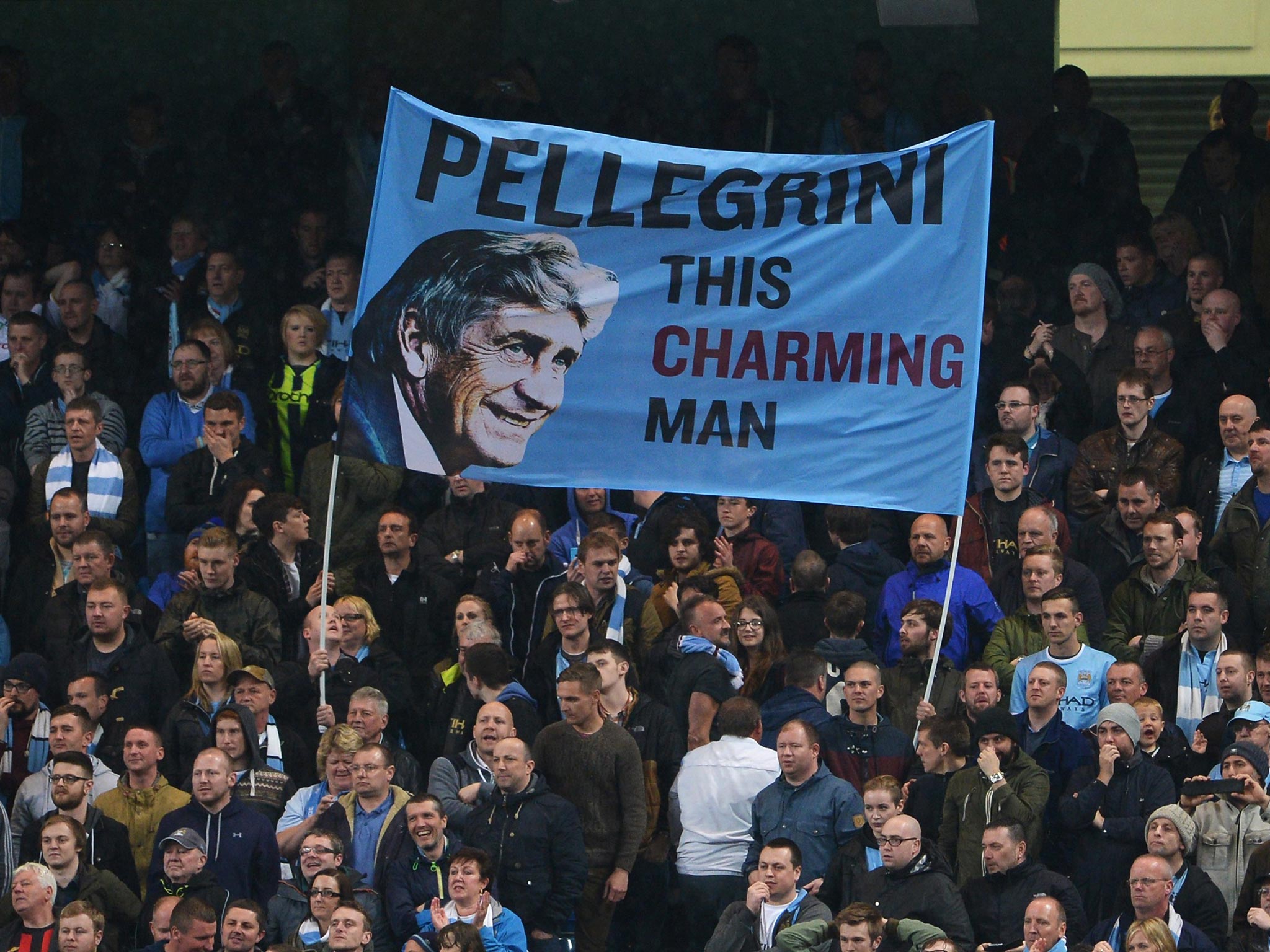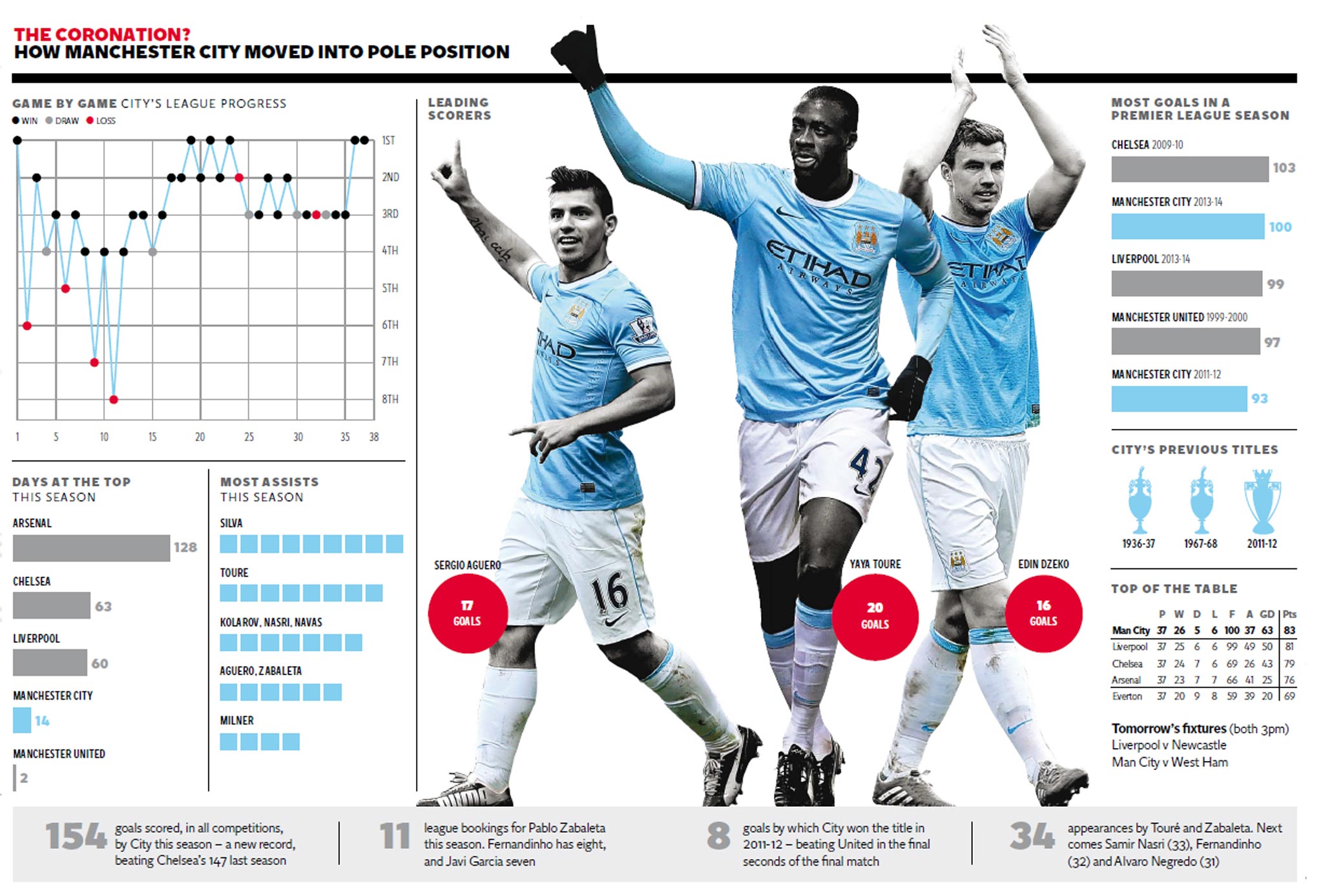Hearts, minds and...title? A portrait of Manuel Pellegrini, who sees life's bigger picture
The quiet and intelligent Manchester City manager is on the brink of reaping reward for rising above Premier League's sound and fury

Your support helps us to tell the story
From reproductive rights to climate change to Big Tech, The Independent is on the ground when the story is developing. Whether it's investigating the financials of Elon Musk's pro-Trump PAC or producing our latest documentary, 'The A Word', which shines a light on the American women fighting for reproductive rights, we know how important it is to parse out the facts from the messaging.
At such a critical moment in US history, we need reporters on the ground. Your donation allows us to keep sending journalists to speak to both sides of the story.
The Independent is trusted by Americans across the entire political spectrum. And unlike many other quality news outlets, we choose not to lock Americans out of our reporting and analysis with paywalls. We believe quality journalism should be available to everyone, paid for by those who can afford it.
Your support makes all the difference.Against the backdrop of a season in which he has been the Premier League's quiet man, keeping his counsel amid the sound and fury and frequent nonsense of the managerial press conference circuit, it was a shock to hear Manuel Pellegrini disclose that he had once been a mad dog.
"Absolutely, yes" he said, deadpan, when that suggestion was put to him, following his own disclosure that the calmness and equanimity we have witnessed from him in the past nine months did not belong to Pellegrini the player. "When I started this career maybe I had an absolutely different character," he said. "As a player, I had a different character. To prepare to be a manager you must change a lot of things."
He has never really been a mad dog, of course. Neither whilst a player, as a centre-half of 13 years' standing for Universidad de Chile where his only impulsive decision was to quit – when a 17-year-old, Ivan Zamorano, took him to the cleaners in 1987 and he decided it was over. Nor as a manager. The qualities in him which have taken Manchester City to the brink of their greatest season – the first in which they have clinched two domestic trophies and only the second, after 1969-70, to have delivered any kind of double – are intelligence, intellect and introversion.
Those might not add up to captivating press conferences but many will rightly say it has been a beautiful release from the football warfare propagated by Jose Mourinho – who has stalked Pellegrini around Europe these last few years, taking his job at Real Madrid and alighting back in the Premier League just as the Chilean arrived last summer.
Engaging with such a manager is certainly not as straightforward for supporters, though the significance of the banner bearing Pellegrini's image beside the words "This Charming Man" – after The Smiths song of 1983 – was quietly pointed out to him on Wednesday night, after it was raised during the victory over Aston Villa. The chant carrying his name is growing louder, too. "Sheikh Mansour went to Spain in a Lamborghini; brought us back a manager – Manuel Pellegrini."
The truth is that Chileans wondered whether their gentle compatriot would hack it quite like this, in the English bear pit. "Is Chile's Pellegrini too decent to coach in the Premier League?" one headline from the Santiago Times asked last summer, and it is from his compatriots that a fuller picture emerges of this most enigmatic football manager.

The tale has been well aired by now of how, late in his playing days, the cerebral Pellegrini combined football with civil engineering studies and helped in the rebuilding of homes devastated by the Chilean earthquake. He built a summer house for his friend Dr Alejandro Orizola – then a club physio, now head of the club's medical team – at that time, too. Not beautiful but functional.
Less appreciated is how alien his own interest in football was to the intellectual, deeply conservative Pellegrini family, not least his own father Emilio, a self-made civil engineer whose steps he might have followed.
Pellegrini acquired many traits from his father – self-discipline and a thirst for education were among them – but Emilio only acquired an interest in his son's sporting success when he became internationally well-known, playing football for a Chilean national side which was ostracised and struggling, in the darkest days of the Pinochet regime.
Politics was what absorbed the Pellegrinis – Manuel included. The City manager's mother Silvia Ripamonti, was a supporter of the military dictatorship, and his brother Pablo ran as a candidate for deputy for the UDI (Union Democrata Independiente), a right-wing party in the Chilean government. Exiled by his football career, Pellegrini has expressed frustration that he, like other expatriate Chileans, cannot vote.
The timing of his father's death last year – and its apparent emotional effect on Pellegrini – brought these two worlds crashing together. Pellegrini had just taken Malaga to the Champions League semi-final against Borussia Dortmund and he returned from the funeral in Chile for the away leg to witness the dismal refereeing display which caused his team's 3-2 defeat.
There followed an unprecedented, excoriating outburst from Pellegrini against the Scottish referee. The suggestion has always been that an emotional dam had burst.
He certainly inherited a thirst for knowledge from his father. "If you ask me if the next life I want to be a football coach, I would say 'no'," Pellegrini admitted in one interview. "I'd want to be an artist. A writer, painter, sculptor. I would like to do things I do not know today, things I would like to know. I think that's why I end up reading so much, because in this way I have experienced other lives."
The analysis and interest in the workings of "other lives" certainly seems to have been the key contributory factor to him being such a serial winner in football. After Roberto Mancini's relationships with most players had degenerated into a state of dire toxicity, City's chief executive, Ferran Soriano, wanted his next manager to be one who would build up the team ethic again.
It is the quality that all Pellegrini's players talk about. Diego Forlan, who played under him at Villarreal, has recently spoken of this and David Silva certainly bore out Forlan's testimony in his own definition, this week, of how the man they call El Ingeniero ("the Engineer") has rebuilt the team.
"He's made it a happy place," Silva said. "He's brought a joy and happiness around the place. Also to our style of play. You see that in the way we play, attack-minded, lots of goals. He's made us competitive in every competition. We've gone further in them. He's given us that extra push and taken us one step further maybe. His calmness has been obvious. He's added that to the whole club. And it really helps us at difficult moments."
In many ways, this 60-year-old, who had actually yearned to study medicine before turning to engineering because "I didn't have the intellect", is one of the most improbable of Premier League title-winning managers. If City secure the league on Sunday, the comparisons with another quiet man, Joe Mercer, will come crashing in, though for leading Manchester football historian Gary James, Tony Book is the better comparison.
Book, manager from 1973 to 1979, was also uneasy in front of the press, yet it was he who managed City to the League Cup in 1976, made them runners-up to Liverpool in the 1977 First Division and got them to a 1978-79 Uefa Cup quarter-final with Borussia Mönchengladbach which many thought was there to be won. City marginalised him before that match came, because they wanted to bring back the razzmatazz of Malcolm Allison instead. The hype and the noise started again, City evaporated and so did the European dream.
"Book didn't really get the headlines or seek them," says James, author of The Manchester City Years. "He would keep it simple in what he said." Now, 35 years on, City are learning all over again what an incredible force for good a quiet man can be.
Join our commenting forum
Join thought-provoking conversations, follow other Independent readers and see their replies
0Comments